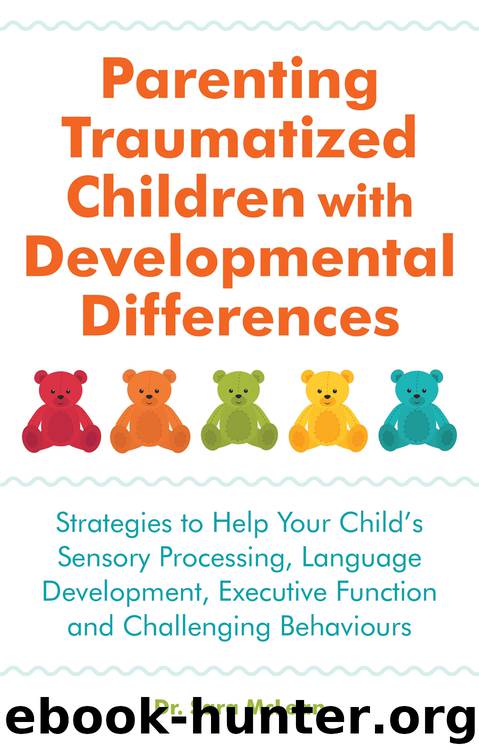Parenting Traumatized Children with Developmental Differences by Sara McLean

Author:Sara McLean
Language: eng
Format: epub
ISBN: 9781784508050
Publisher: Jessica Kingsley Publishers
Published: 2019-02-12T16:00:00+00:00
If your child has trouble in using language in practical and social ways
If your child has difficulty with the social use of language (social communication difficulty), you may notice the following behaviours:
• They may not be able to use language in all the ways expected of a child their age (to say hello, to ask for help, to give directions, to give instructions).
• Your child may have trouble adjusting their language to suit the context and the needs of their audience (for example, they may have difficulty in moderating their voice when they come indoors; or changing to ‘polite’ language when talking to a teacher; or in simplifying their language to suit a much younger child).
• Your child takes things very literally. They may have real trouble in understanding metaphors and jokes based on double meanings.
• Your child has not picked up the implicit ‘rules’ and social conventions of language. For example, they do not understand that you take turns in conversation or that you stick to the topic being discussed and don’t re-direct conversation towards your own interests.
• Your child’s voice might lack rhythm and may not vary in intonation or pace.
• You may find your child has difficulty in transferring and applying the social rules of conversation from one setting to another.
If you suspect that your child has difficulty with a communication disorder, try these strategies:
• You will need to teach your child the actual words to use in common social situations. Whereas most children will pick up social conventions automatically, your child won’t pick this up by themselves and will need explicit teaching. Examples of unspoken social conventions include what to say when greeting someone; how to announce you are leaving and say goodbye; how to start a conversation with someone; how to ask for help; how to ask to join a social group; how to address a teacher or a neighbour.
• Practise ‘noticing’ how conversations and social interactions happen; for example, by watching movies together. Teach your child the ‘rules’ of conversation and turn taking in particular.
• Encourage your child to practise giving eye contact, or intermittent eye contact, to the extent that they are able and willing. Many children who have ASD or who have been severely mistreated may have difficulty in giving eye contact but they should be encouraged (not forced) to give eye contact to the level they are able. Some children who are uncomfortable with eye contact can nonetheless learn to look at others’ eyebrows or nose – which is often more acceptable to other children in their social group than breaking the ‘unwritten rule’ of giving eye contact, by your child refusing to look at someone they are talking to.
The resources section at the back of this book has websites and resources that can be helpful if you suspect that your child has a communication disorder.
Download
This site does not store any files on its server. We only index and link to content provided by other sites. Please contact the content providers to delete copyright contents if any and email us, we'll remove relevant links or contents immediately.
Rewire Your Anxious Brain by Catherine M. Pittman(18638)
Talking to Strangers by Malcolm Gladwell(13342)
The Art of Thinking Clearly by Rolf Dobelli(10443)
Mindhunter: Inside the FBI's Elite Serial Crime Unit by John E. Douglas & Mark Olshaker(9313)
Becoming Supernatural by Dr. Joe Dispenza(8196)
Change Your Questions, Change Your Life by Marilee Adams(7753)
Nudge - Improving Decisions about Health, Wealth, and Happiness by Thaler Sunstein(7689)
The Road Less Traveled by M. Scott Peck(7592)
The Lost Art of Listening by Michael P. Nichols(7487)
Mastermind: How to Think Like Sherlock Holmes by Maria Konnikova(7313)
Enlightenment Now: The Case for Reason, Science, Humanism, and Progress by Steven Pinker(7305)
Win Bigly by Scott Adams(7183)
The Way of Zen by Alan W. Watts(6594)
Daring Greatly by Brene Brown(6501)
Big Magic: Creative Living Beyond Fear by Elizabeth Gilbert(5752)
Grit by Angela Duckworth(5598)
Ego Is the Enemy by Ryan Holiday(5412)
Men In Love by Nancy Friday(5231)
The Laws of Human Nature by Robert Greene(5166)
